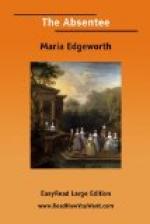Lady Isabel of course retorted. But we leave this amiable mother and daughter to recriminate in appropriate terms, and we follow our hero, rejoiced that he has been disentangled from their snares. Those who have never been in similar peril will wonder much that he did not escape sooner; those who have ever been in like danger will wonder more that he escaped at all. Those who are best acquainted with the heart or imagination of man will be most ready to acknowledge that the combined charms of wit, beauty, and flattery, may, for a time, suspend the action of right reason in the mind of the greatest philosopher, or operate against the resolutions of the greatest of heroes.
Lord Colambre pursued his way to Castle Halloran, desirous, before he quitted this part of the country, to take leave of the count, who had shown him much civility, and for whose honourable conduct, and generous character, he had conceived a high esteem, which no little peculiarities of antiquated dress or manner could diminish. Indeed, the old-fashioned politeness of what was formerly called a well-bred gentleman pleased him better than the indolent or insolent selfishness of modern men of the ton. Perhaps, notwithstanding our hero’s determination to turn his mind from everything connected with the idea of Miss Nugent, some latent curiosity about the burial-place of the Nugents might have operated to make him call upon the count. In this hope he was disappointed; for a cross miller to whom the abbey-ground was set, on which the burial-place was found, had taken it into his head to refuse admittance, and none could enter his ground.
Count O’Halloran was much pleased by Lord Colambre’s visit. The very day of Lord Colambre’s arrival at Halloran Castle, the count was going to Oranmore; he was dressed, and his carriage was waiting; therefore Lord Colambre begged that he might not detain him, and the count requested his lordship to accompany him.
’Let me have the honour of introducing you, my lord, to a family, with whom, I am persuaded, you will be pleased; by whom you will be appreciated; and at whose house you will have an opportunity of seeing the best manner of living of the Irish nobility.’ Lord Colambre accepted the invitation, and was introduced at Oranmore. The dignified appearance and respectable character of Lady Oranmore; the charming unaffected manners of her daughters; the air of domestic happiness and comfort in her family; the becoming magnificence, free from ostentation, in her whole establishment; the respect and affection with which she was treated by all who approached her, delighted and touched Lord Colambre; the more, perhaps, because he had heard this family so unjustly abused; and because he saw Lady Oranmore and her daughter, in immediate contrast to Lady Dashfort and Lady Isabel.’




